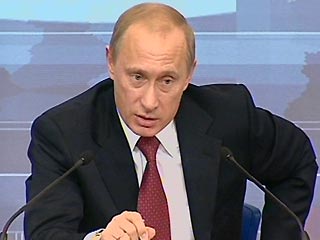Putin acknowledges state's implication in Yukos intrigue
The statement from the president sounded rather cynical, taking into consideration the auction process and the events that preceded and followed it
The last week was marked with a very important event in Russia. It took the state a year to accomplish that: President Putin virtually acknowledged at the press conference in the Kremlin that the main objective of the notorious Yukos case was connected with the state's aspiration to retrieve the assets, which belonged to Mikhail Khodorkovsky. One shall presume that the tax equity issue had nothing to do with the matter. 

The intrigue with Yukos's major asset – the company Yuganskeftegaz – finally ended when the state-owned oil company Rosneft, which acquired it from the unknown Baikal Finance Group, a mystical company that purchased the enterprise at an auction last week. It is absolutely logic to suggest now that Yuganskneftegaz will soon be owned by Gazprom.
When Putin was answering a question at the conference about the sale of Yuganskneftegaz, he proudly stated that the transaction was performed in an absolutely market way. The statement sounds rather cynical, taking into consideration the auction process, the events that preceded and followed it. Putin described the recent auction as the aspiration of the state to guarantee its interests, whereas many market members used Russian auctions in the beginning of the privatization era (back in the 1990s) to acquire the multi-billion state property. It is noteworthy that Putin referred to the businessmen from Baikal Finance Group as wonderful private entrepreneurs. The president, however, did not specify the reason why those mysterious entrepreneurs had to disguise themselves as a fake company – this business method bears some resemblance to the above-mentioned plundering privatization in the beginning of the 1990s.
One may say that Vladimir Putin's opinion regarding the events with Yukos and Yuganskneftegaz became the moment of truth. It is not known if Putin's comments were a part of the Kremlin's plans, although it is obvious that they helped dot all the “i's” as far as Yukos is concerned. Putin's manner of answering the Yukos question showed that either the president was not aware of the details, or he simply set out somebody else's ideas.
Vladimir Putin's revelations might lead to rather negative consequences, though. On the one hand, the Russian president disappointed and irritated spokespeople for the world business, but on the other hand Putin buried Western politicians' hopes to conduct a constructive dialogue with Russia. Until recently, the president managed to stay away from the Yukos scandal: Putin positioned himself as a respectable liberal politician. Nevertheless, the latest events made the world take a different look at the Russian president. High-ranking officials from the USA and other countries, spokespeople for the world business elite have released quite harsh statements on the matter.
Russia's economic revival is possible only in a close contact with the rest of the world, with developed countries first and foremost. However, Putin's comments about the Yukos case cannot but influence the USA's stance. The US administration will most likely have to take the side of their “offended Yukos shareholders.”
The Russian president probably had to dance to the tune of his milieu that strives for the creation of the state capitalism system in Russia. The majority of Russian people support the idea of taking the riches from the private business and handing them over to the state control. However, as experience shows, the state ownership of mining industries does not guarantee the economic stability: the state capital is efficient only in several countries with a high level of economic relations, which excludes Russia. Natural wealth and means of production will find themselves in politicians' hands in all other cases. One may find the proofs of that in the countries of the Middle East and Latin America. It is not ruled out that Russia is sliding to the Latin-American way of development.
Subscribe to Pravda.Ru Telegram channel, Facebook, RSS!


